#neighborhood historian
Explore tagged Tumblr posts
Text
as black folk, womenfolk, and queer folk put on their Sunday best and ankh up their respectability politics for kamala harris I look around this lovecraft country of ours where blackness is policed, queerness is criminalized, reconstruction is collapsing (for a third time) and people think replacing a colonizer with a cop is an improvement.
the sun is setting on this empire, but doesn't mean white supremacy and fascism are going anywhere.
#im not woke im just tired#our world#ecosystem of white supremacy#tabletop lunch talks#kamala harris#joe biden#the donald#padawan historian#neighborhood historian
11 notes
·
View notes
Text
i think my ideal physical form is just as close to a corpse as i can get. i would’ve done numbers in the 1840s.
#dark dark eye bags#pale pale skin with veins showing#chapped lips#like come on let’s bring back consumption chic#(this is all a joke from your friendly neighborhood historian)
9 notes
·
View notes
Text
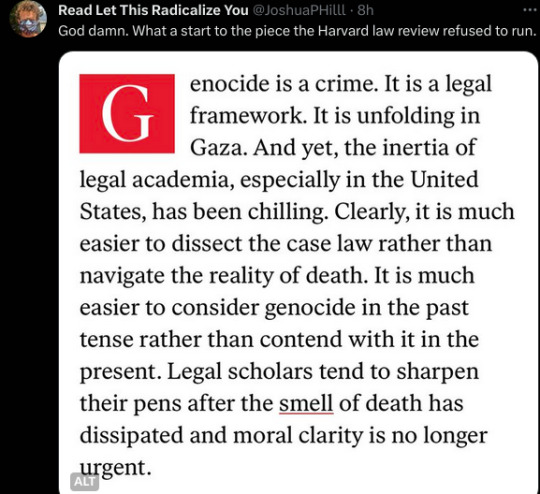
In a statement that was shared with The Nation, a group of 25 HLR editors expressed their concerns about the decision. “At a time when the Law Review was facing a public intimidation and harassment campaign, the journal’s leadership intervened to stop publication,” they wrote. “The body of editors—none of whom are Palestinian—voted to sustain that decision. We are unaware of any other solicited piece that has been revoked by the Law Review in this way. “ When asked for comment, the leadership of the Harvard Law Review referred The Nation to a message posted on the journal’s website. “Like every academic journal, the Harvard Law Review has rigorous editorial processes governing how it solicits, evaluates, and determines when and whether to publish a piece…” the note began. ”Last week, the full body met and deliberated over whether to publish a particular Blog piece that had been solicited by two editors. A substantial majority voted not to proceed with publication.” Today, The Nation is sharing the piece that the Harvard Law Review refused to run. Some may claim that the invocation of genocide, especially in Gaza, is fraught. But does one have to wait for a genocide to be successfully completed to name it? This logic contributes to the politics of denial. When it comes to Gaza, there is a sense of moral hypocrisy that undergirds Western epistemological approaches, one which mutes the ability to name the violence inflicted upon Palestinians. But naming injustice is crucial to claiming justice. If the international community takes its crimes seriously, then the discussion about the unfolding genocide in Gaza is not a matter of mere semantics. The UN Genocide Convention defines the crime of genocide as certain acts “committed with the intent to destroy, in whole or in part, a national, ethnical, racial or religious group, as such.” These acts include “killing members of a protected group” or “causing serious bodily or mental harm” or “deliberately inflicting on the group conditions of life calculated to bring about its physical destruction in whole or in part.” Numerous statements made by top Israeli politicians affirm their intentions. There is a forming consensus among leading scholars in the field of genocide studies that “these statements could easily be construed as indicating a genocidal intent,” as Omer Bartov, an authority in the field, writes. More importantly, genocide is the material reality of Palestinians in Gaza: an entrapped, displaced, starved, water-deprived population of 2.3 million facing massive bombardments and a carnage in one of the most densely populated areas in the world. Over 11,000 people have already been killed. That is one person out of every 200 people in Gaza. Tens of thousands are injured, and over 45% of homes in Gaza have been destroyed. The United Nations Secretary General said that Gaza is becoming a “graveyard for children,” but a cessation of the carnage—a ceasefire—remains elusive. Israel continues to blatantly violate international law: dropping white phosphorus from the sky, dispersing death in all directions, shedding blood, shelling neighborhoods, striking schools, hospitals, and universities, bombing churches and mosques, wiping out families, and ethnically cleansing an entire region in both callous and systemic manner. What do you call this? The Center for Constitutional Rights issued a thorough, 44-page, factual and legal analysis, asserting that “there is a plausible and credible case that Israel is committing genocide against the Palestinian population in Gaza.” Raz Segal, a historian of the Holocaust and genocide studies, calls the situation in Gaza “a textbook case of Genocide unfolding in front of our eyes.”
#palestine#gaza#free palestine#end the the colonialism#end the occupation#harvard#harvard law review#genocide
7K notes
·
View notes
Text

The Women's House of Detention
A Queer History of a Forgotten Prison
Hugh Ryan
This singular history of a prison, and the queer women and trans people held there, is a window into the policing of queerness and radical politics in the twentieth century.
The Women's House of Detention, a landmark that ushered in the modern era of women's imprisonment, is now largely forgotten. But when it stood in New York City's Greenwich Village, from 1929 to 1974, it was a nexus for the tens of thousands of women, transgender men, and gender-nonconforming people who inhabited its crowded cells. Some of these inmates--Angela Davis, Andrea Dworkin, Afeni Shakur--were famous, but the vast majority were incarcerated for the crimes of being poor and improperly feminine. Today, approximately 40 percent of the people in women's prisons identify as queer; in earlier decades, that percentage was almost certainly higher.
Historian Hugh Ryan explores the roots of this crisis and reconstructs the little-known lives of incarcerated New Yorkers, making a uniquely queer case for prison abolition--and demonstrating that by queering the Village, the House of D helped defined queerness for the rest of America. From the lesbian communities forged through the Women's House of Detention to the turbulent prison riots that presaged Stonewall, this is the story of one building and much more: the people it caged, the neighborhood it changed, and the resistance it inspired.
Winner, 2023 Stonewall Book Award--Israel Fishman Non-Fiction Book Award CrimeReads, Best True Crime Books of the Year
(Affiliate link above)
#queer history#queer#lgbt#lgbt history#lesbian history#transgender history#transgender#gay history#making queer history#queer books#queer nonfiction#lgbt books#lgbt nonfiction
757 notes
·
View notes
Text
A local organization here has released a list of books that they feel are imperative to have in the time ahead. The list was not easily shareable, so I copy-pasted it here.
There is no need to read all of these, but one thing you can do that takes little effort is call your library and see if they have them in stock.
If you are moneyed, you can buy some copies and put them in little free libraries.
EDUCATING FOR ADVOCACY BOOK LIST
All books are written by authors from that culture
BOOKS FOR ADULTS
(2024) Be a Revolution: How Everyday People are Fighting Oppression and Changing the World - and How You Can, Too by Ijeoma Oluo
Each chapter discusses how someone is advocating for oppressed populations
and has examples of how others can do the same or similar.
(2024) The Message by Ta-Nehisi Coates
The author travels to Senegal, South Carolina and Palestine and grapples with deep questions and emotions.
(2023) Better Living Through Birding: Notes From a Black Man in the Natural World by Christian Cooper
A memoir of a Black man learning to claim space for himself and others like him.
(2022) Myth America: Historians Take On the Biggest Legends and Lies about Our Past Edited by Kevin M. Kruse and Julian E. Zelizer
The title explains it so well.
(2022) South to America: A Journey Below the Mason Dixon to Understand the Soul of a Nation by Imani Perry
History, rituals, and landscapes of the American South and why they must be understand it in order to understand America.
(2022) Memphis by Tara M. Stringfellow
Tells the story of 3 generations of a Southern Black family in Memphis.
(2021) How the Word is Passed: A Reckoning with the History of Slavery Across America by Clint Smith
An exploration of important monuments and landmarks in the USA that show
how slavery has been foundational in the development and history of our country.
(2021) The Sum of Us: What Racism Costs Everyone and How We Can Prosper Together by Heather McGhee
The title explains it.
(2021) The Seed Keeper by Diane Wilson
Historical fiction telling the story of several generations of a Dakota family
(2020) The Good Immigrant: 26 Writers Reflect on America edited by Nikesh Shukla and Chimene Suleyman
26 authors share their stories of living in the USA.
(2020) Caste: The Origins of Our Discontents by Isabel Wilkerson
Examines the unspoken caste system that has shaped America and shows how we continue to be defined in this way..
(2020) This Is What America Looks Like: My Journey from Refugee to Congresswoman
by Ilhan Omar
This title explains it.
(2019) The 1619 Project: A New Origin Story by Nikole Hannah Jones (among others)
Reframes our understanding of American history by placing slavery and its continuing legacy at the center of our national narrative.
(2019) Things are Good Now by Djamila Ibrahim
Stories of how migrants sort out their lives in foreign lands.
(2018) So You Want to Talk About Race by Ijeoma Oluo
An examination of race in America.
(2018) I’m Still Here by Austin Channing Brown
A memoir telling her journey of learning to love her blackness while navigating America's racial divide.
(2018) If They Come for Us by Fatimah Asghar
Poetry that captures the experience of being a Pakistani Muslim woman in contemporary America, while exploring identity, violence, and healing.
(2016) Stamped from the Beginning: The Definitive History of History of Racist Ideas in America by Ibram X. Kendi
Traces the history of Black America.
(2015) Between the World and Me by Ta-Nehisi Coates
A memoir, in the form of a letter to his young son, telling his personal experiences with racism and violence in the United States.
(2015) My Seneca Village by Marilyn Nelson
Poetry and information about Seneca Village – a multi-racial, multi-ethnic neighborhood in the center of Manhattan (Central Park ) that thrived in the mid-19th century.
(2014) An Indigenous Peoples' History of the United States by Roxanne Dunbar-Ortiz
Tells the 400+ years of US history, from the perspective of Indigenous peoples
(2013) Braiding Sweetgrass: Indigenous Wisdom Scientific Knowledge, and the Teaching of Plants by Robin Wall Kimmerer
Explores the place of plants and botany in both Indigenous and Western life.
(2010) The Warmth of Other Suns: The Epic Story of America’s Great Migration by Isabel Wilkerson
Follows the stories of three Black Americans’ migration journeys from Mississippi, Florida and Louisiana.
(2010) The New Jim Crow: Mass Incarceration in the Age of Colorblindness
By Michelle Alexander
Explains how we haven’t ended, but have redesigned, the caste system in the U.S.
(1972) Lame Deer, Seeker of Visions by John (Fire) Lame Deer and Richard Erdoes
Told by Lame Deer, a Lakota medicine man, this memoir teaches the history of Indigenous people in the USA.
BOOKS FOR GRADES K-12
GRADES 7 - 12
(2021) Firekeeper’s Daughter by Angeline Boulley
The novel's main character is a young woman with a French mother and an Ojibwe father, who often feels torn between cultures.
(2021) The 1619 Project: Born on the Water by Nikole Hannah-Jones and Renée Watson
Illustrated by Nikkolas Smith
Tells the story and consequences of American slavery in verse.
(2020) Stamped: Racism, Antiracism, and You by Jason Reynolds and Ibram X. Kendi
Shorter and appropriate for middle and high schoolers.
(2020) All Boys Aren’t Blue by George M. Johnson
Series of personal essays about the author’s life growing up as a gay, black man.
(2020) Dictionary for a Better World: Poems, Quotes, and Anecdotes from A to Z by Irene Latham and Charles Waters Illustrated by Mehrdokt Amini
Explained in title.
(2020) Woke: A Young Poet’s Call to Justice by Mahogany L. Browne with Elizabeth Acevedo and Olivia Gatewood Illustrated by Theodore Taylor III
Poetry about fighting for racial justice through joy and passion.
(2020) Be Amazing: A History of Pride by Desmond Is Amazing Illustrated by Dylan Glynn
The history of Pride, with bold illustrations, focusing on the importance of embracing one’s own uniqueness and tuning out the haters.
(2020) Dear Justyce (Dear Martin #2) by Nic Stone
Continues the story of Justyce from Dear Martin in a series of flashbacks and letters.
(2020) Punching the Air by Ibi Zoboi and Yusef Salaam
A novel in verse about a boy who is wrongfully incarcerated.
(2019) Gender Queer: A Memoir by Maia Kobab
The author tells the story of life as a nonbinary person in graphic novel form.
(2019) An Indigenous Peoples' History of the United States for Young People original book by Roxanne Dunbar-Ortiz adapted by Debbie Rees and Jean Mendoza
Shorter and appropriate for middle and high schoolers
(2017) Sea Prayer by Khalad Hosseini Illustrated by Dan Williams
Written as a poetic letter, from father to son, this is a story of the journey of refugees.
(2017) Dear Martin (Dear Martin #1) by Nic Stone
A story of the realities of a Black teen living in America.
(2015) All American Boys by Jason Reynolds and Brendan Kiely
From the perspective of two teenage boys, one Black and one White, a story is told with the realization that racism and prejudice are still alive and well.
(2015) Beyond Magenta: Transgender and Nonbinary Teens Speak Out by Susan Kuklin
The author interviewed six transgender for gender-neutral young adults and lets
them tell their story.
(2011) Heart and Soul: The Story of America and African Americans written and illustrated by Kadir Nelson
The title explains it well
GRADES 4 - 6
(2023) An American Story by Kwame Alexander illustrated by Dare Coulter
Tells the story, poetically and honestly, about American slavery
(2023) Step by Step!: How the Lincoln School Marchers Blazed a Trail to Justice
by Debbie Rigaud and Carlotta Penn illustrated by Nysha Pierce
Tells the story of a group of Black mothers and children and their two-year march to integrate an Ohio elementary school.
(2022) Say Their Names by Caroline Brewer illustrated by Adrian Brandon
A young Black girl leads a #BlackLivesMatter protest march.
(2021) Stamped (For Kids): Racism, Antiracism, and You by Jason Reynolds and Ibram X. Kendi.
Shorter, more kid friendly version of Stamped from the Beginning.
(2021) Unspeakable: The Tulsa Race Massacre by Carole Boston Weatherford illustrated by Floyd Cooper
Traces the history of this African-American ‘Wall Street District’ and its destruction by White supremacists.
(2016). I Dissent: Ruth Bader Ginsburg Makes Her Mark by Debbie Levy illustrated by Elizabeth Baddeley
The life and work of RBG told in picture book form.
(2008) Silent Music: A Story of Baghdad written and illustrated by James Rumford
Ancient and recent history of Baghdad from the perspective of a young boy.
(2005) Show Way by Jacqueline Woodson illustrated by Hudson Talbott
Traces the history of the ‘show way’ quilt from slavery through freedom.
(2005) My Name is Bilal by Asma Mobin-Uddin illustrated by Barbara Kiwak
Muslim-American student experiencing religious prejudice.
(2005). Amelia to Zora: Twenty-Six Women Who Changed the World by Cynthia Chin-Lee Ilustrated by Megan Halsey and Sean Addy
An alphabet book that teaches about the extraordinary lives of 26 women.
(1978). The Other Way to Listen by Byrd Baylor and Peter Parnall
Helps children learn about indigenous cultures.
GRADES PRE-K - 3
(2023) These Olive Trees: A Palestinian Family’s Story written and illustrated by Aya Ghanameh
A story of a young girl and her family in Nablus, Palestine, 1967
(2020). Antiracist Baby by Ibram X. Kendi illustrated by Ashley Lukashvsky
Teaches young children how to be an antiracist.
(2016). When We Were Alone by David A. Robertson and Julie Flett
A young, indigenous girl learns about her grandmother’s experience in a
residential school.
(2013). A is for Activist by Innosanto Nagara (board book)
An ABC book that teaches children about being an activist.
653 notes
·
View notes
Text
I think people forget that the Nazis never said they were the bad guys. If someone says, hey, I’m evil! You don’t let them take over your country. They presented themselves as scientific, not hateful. By their own account, they were progressives, and the superiority of White Europe over the other races was a proven and immutable fact. They had scientists and archaeologists and historians to prove it. They didn’t tell people they wanted to kill the Jews because they were hateful. They manufactured evidence to frame us for very real tragedies, and they had methodological research to prove that we were genetically predisposed to misconduct. Wouldn’t you believe that?
Hollywood has spent the last 80 years portraying the Nazis as an obvious and intimidating evil. That’s a good thing in some ways, because we want general audiences to recognize that they were evil. But we also want them to be able to recognize how and why they came to power. Not by self-describing themselves as an evil empire, but by convincing people that they were the good guys and the saviors. They hosted the Olympics. Several European countries capitulated and volunteered themselves to the Empire. There were American and British Fascist Parties. They had broad public support. Hollywood never shows that part, so general audiences never learn to recognize the actual signs of antisemitism.
People today think they can’t possibly be antisemitic, because they’re leftist! They abhor bigotry! They could never comprehend Nazi ideology coming from the mouth of a bisexual college student wearing a graphic tee and jeans. How could they? The only depiction of antisemites they’ve ever seen have been gaunt, pale, middle-aged men in black leather trench coats with skulls on their caps.
If the Nazis time-travelled from the 1930s and wanted to take power now, they’d change their original tactics, but not by much. They would target countries suffering from an identity crisis and an economic collapse. They would portray themselves as the pinnacle of what that society considers progressive. Back then, it was race science. These days it’s performative wokeness. Once they’d garnered enough respect and reputation, they’d begin manufacturing propaganda and lies to manipulate people’s anger and fears at a single target— Jews.
If the Nazis made an actual return, they wouldn’t look like neo-Nazis. They wouldn’t be nearly as obvious about their hatred. Their evil wouldn’t give them yellow eyes, and no suspenseful music would play when they walked in the room. They’d be friendly. They’d look like you. They would learn what things your community fears and what things you already hate. They would lie and fabricate evidence to connect the rich elites and the imperialists you revile to a single source of unequivocal Jewish evil. It wouldn’t be hard— they already have two-thousand years of institutional antisemitism they can rely on to paint their picture.
If you’re curious why antisemitism today is coming from grassroots organizations, young, liberal college campuses, suburban neighborhoods with pride flags and All Are Welcome Here signs? That’s why. It’s because, as a global society, we’ve forgotten that the world didn’t used to see the Nazis as bad guys. And what is forgotten about history is doomed to be repeated.
1K notes
·
View notes
Text
As a Holocaust historian I have to say that I am deeply disturbed by how much everyone hates Jews. It’s like they waited for Israel to do something real bad until they felt like it was ok to pull out their latent desire to yell that “Hitler was right.”
Deeply. And some of those responses to my now deleted post will live rent free in my head.
If your first impulse upon seeing this is to scream at me about how I’m making atrocities in Gaza about my feelings, you hate Jews. You fucking hate Jews and you should at least have the grace to own it.
Now go show your ass and unfollow me.
ps: I’m not playing Nice Neighborhood Public Historian rn. I’m angry and scared and frankly traumatized. Shitty responses will be publicly shamed and then deleted and the user blocked.
2K notes
·
View notes
Text
'I am no king, but Caesar'

Gaius Julius Caesar was born on July 12, 100 BC in the Suburra, a populous neighborhood of Rome, to a patrician family although in economic decline. In Gens Iulia, those who had the surname Caesar descended, according to the account of Pliny the Elder, from a man who was born after a Caesarean section (from the Latin verb "to cut", caedo, -ĕre, caesus sum). He was born in a Republic in crisis and the aristocracy divided into two warring factions: The optimates and populares. He lost his father when he was about 14 years old; he was greatly influenced by his maternal uncle Gaius Marius. Caesar had an older sister, Julia Major, and a younger sister Julia Minor (maternal grandmother of Emperor Augustus). His uncle, Gaius Marius, was the leader of the Populares ("supporters of the people") and rival of Lucius Cornelius Sulla, leader of the Optimates ( "best ones")

In 84 BC Lucius Cornelius Cinna, an ally of Gaius Marius, chose the 16 year old Caesar to be flamen Dialis (priest of Jupiter) and married him to his 13 year old daughter Cornelia with whom Caesar had a daughter named Julia. It is not certain whether the girl was born a few months before or after the teen Caesar had fled Rome or, more likely according to historians, she was born when he returned years later and was reunited with his wife.
Following the suicide of Gaius Marius in 86 BC, Cinna, one of the leaders of the Populares, became sole ruler of Rome and most of the provinces while persecuting Sulla's followers. In 84 Cinna was assassinated and populares defeated.
Due of his ties to the Cinna family, Sulla attempted to force Caesar to divorce Cornelia if he wanted to live in peace, but Caesar refused. Sulla confiscated his property, and he was forced to leave Rome. Populares supporters and Caesar's own mother pressured Sulla to allow him to return, claiming that he was not dangerous as he was just an adolescent. Sulla refused and said "I see several Marius in him" referring to his archrival Gaius Marius, Caesar's uncle.
Shortly afterwards, although he was allowed to return to Rome, Caesar decided to head to Asia to participate in the war against Mithridates VI of Pontus. There he distinguished himself in the capture of Mytilene. He then headed to Bithynia, a kingdom allied to Rome, where he spent some time.

In addition to being a politician and a soldier, Julius Caesar was a writer. Among others, his works were a treatise on astronomy, another on Roman religion, a study on Latin and his comments on the war in Gaul and the Civil War; only his writings on those two wars have not been lost.
In the year 78 after Sulla's death from natural causes, Caesar decided finally to return to Rome. He was reunited with his wife Cornelia, who had waited patiently for him. Nine years later, Cornelia- the only woman he truly loved, according to all accounts- died at the age of 28. Caesar went into deep mourning and gave a solemn speech.

After serving as quaestor in the Hispania Ulterior province where he increased his network of clients - patronage was key to success in Roman politics - Caesar returned to Rome in 69 BC where he served as Aedile; he carried out building programs and offered the largest gladiatorial games seen until then. This left him almost bankrupt. In 60 BC he decided to make a private agreement with the prestigious general Pompey the Great and one of the richest man, Marcus Licinius Crassus. Pompey had just put an end to the pirate problem and years earlier, together with Crassus, he had defeated the slave rebellion led by Spartacus.
Pompey and Crassus were hampered in many of their ambitions by the Optimates in the Senate. Caesar, knowing this, approached them to put together an unofficial coalition - known to history as the Triumvirate - if they made him Consul, he would see to it that laws were passed that would benefit them. To further consolidate this alliance, in the year 59 BC Caesar married Pompey to Julia. Although this was a typical political marriage, classical sources state that Julia truly loved Pompey and he loved her.
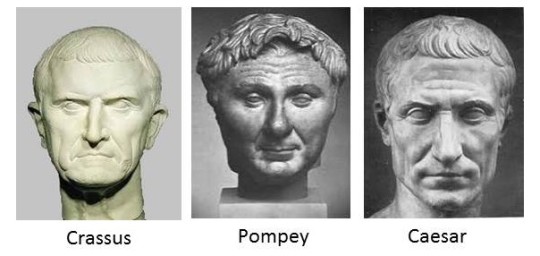
Pompey and Crassus decided to ally themselves with Caesar and the populares in order to gain more offices and wealth. In this way, the three took full control of Rome. In 59 Caesar was appointed consul.
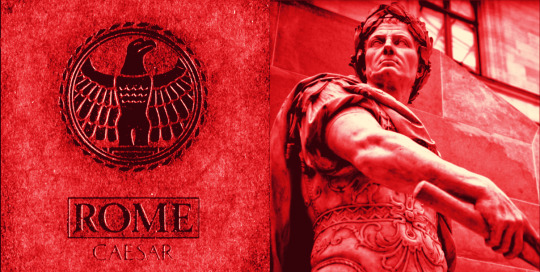
Laws were passed granting the province of Syria to Crassus. Laws were passed distributing lands among Pompey's veterans. And at his own request, the Gallic provinces-both the pacified and the "wild" ones- were handed over to Caesar. Cicero, a true defender of the Republic, was exiled due his bold speeches against the Triumvirate, which he called a "three-headed monster" but was allowed to return the following year. The passage of the laws favoring the triumvirs was ensured by introducing veteran legionaries of Pompey into the meetings of the Senate.
Also in 59 BC Caesar established a military camp in the Arno valley, on the Via Cassi, the main communication route between Rome and the north of the country. He called the camp Florentia, which means "flowering." The camp quickly became an important commercial town. Today it is the beautiful Italian city Florence.

In Gaul with his legions, he defeated and subdued several peoples in just a few years. Caesar wrote in detail about this conquest in his Bellum Gallicum (Gallic War). Believing that everything was under control, he headed to the mysterious land that the Romans called Britannia and where they believed the world ended. The Gallic War was between 58-52 BC

Caesar finally arrived in Britain for the first time in the summer of 55 landing with two legions. The following year he arrived with 800 ships, five legions and 2,000 cavalry. Caesar's comments on this war constitute the first written descriptions of the people, culture and geography of the island.

Although Caesar not conquered Britania (it was conquered under the Emperor Claudius) this campaign it established Rome's first allied peoples in Britain.
While in Britania, Caesar received the news that his daughter and the baby she was expecting had died in childbirth.
At the same time he had no idea that a genuine leader named Vercingetorix, of the Arverni tribe, had managed to unite all the Gallic peoples under his authority, determined to expel the Romans

Caesar himself called him "King of all the Gauls"
The most famous and final battle was that of Alesia. Although Vercingetorix was a great warrior, he could do nothing against the genius (sometimes bordering on madness) of Caesar and his legionaries. According to Caesar, Vercingetorix, seeing that if he continued he would starve his entire people to death due to the siege, rode towards the Roman camp, dismounted, took off his sword and sat on the ground without saying a word. He decided to surrender in exchange for his people living. And so it happened, Vercingetorix was taken prisoner but his men were not executed. But Caesar had to wait years for his triumph -and Vercingetorix had to wait as a prisoner in Rome, before his execution- because while Caesar was fighting against the Gauls, many Roman senators were plotting his downfall.

Everything Caesar wrote about his battles and conquests, written in the third person, was copied and sent to be read publicly in Rome, which was celebrated by the plebs and Caesar 's supporters. True republicans such as Cato, Cicero, Cassius, and Brutus perceived a real danger to the Republic. The Triumvir Crassus was killed by Parthians in his failed attempt to conquer Parthia: The triumvirate was over and Pompey, who had become Sole Consul saw in Caesar a dangerous rival, and allied himself with the Optimates again.
They created a new law: the office of consul or proconsul could no longer be held in absentia, as well as running for those offices outside of Rome. Thus, Caesar, far from Rome, lost the protection of the law that granted him his magistracy—just as today, the President of a nation cannot be prosecuted while in office—and could no longer run for election as consul or proconsul. Clearly, the idea was to put him on trial and send him, hopefully, into exile, since thanks to this law, he instantly became an ordinary citizen.
Upon receiving this news, Caesar was enraged and decided to return to Rome not as a citizen, but as a general commanding his legionaries, who followed him devotedly. He would later say, "I never wanted this war, but my adversaries have eagerly sought it."
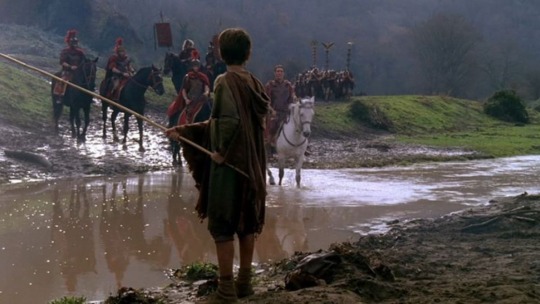
No legion was to reach Rome by crossing the Rubicon River; such an action meant civil war.. Caesar crossed the Rubicon with his XIII legion and proclaimed a very popular phrase in Ancient Rome that players always said before throwing the dice: "Alea Iacta Est" (the die is cast). This is known thanks to Roman historians who took as a source the writings of Gaius Asinius Pollio, who was close to Caesar and could have heard him. This saying became legendary even for the ancient Romans due to the surprising idea of using this phrase from a game in the context of a war.
Pompey and his legionaries left Rome and prepared for the war in Greece. In September of 48 Pompey was defeated at the Battle of Pharsalus. But he did not give up and headed to Egypt to seek the support of the young king Ptolemy XIII. Egypt was then a vassal kingdom of Rome due to its years of indebtedness, and the creditor was precisely Pompey, who had lent huge sums to Ptolemy XII. But as soon as he landed in Egypt, he was met by a group of men who, in the name of the young king, beheaded him and took his ring.
Fun fact: Among those who fought alongside Pompey against Caesar was the centurion Titus Flavius Petro, who after the defeat at Pharsalus was pardoned by Caesar and returned home; he was the grandfather of Titus Flavius Vespasian, the emperor who replaced the Julio-Claudian dynasty with his own Flavian dynasty in 69 AD.
While Cato the Younger and his men went to the province of Africa to continue the resistance, and Pompey's sons did the same in Hispania. Caesar went looking for Pompey to try to come to an agreement.
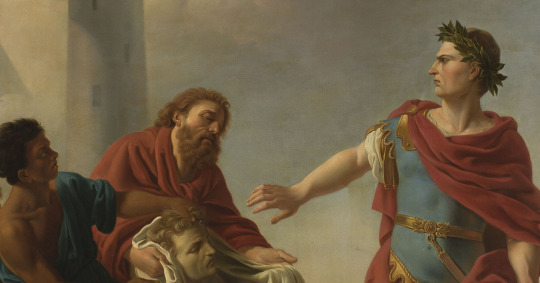
'Julius Caesar’s Dismay Upon Seeing The Head Of Pompey' (detail) By Louis-Jean-François Lagrenée (18th century)
King Ptolemy XIII, who was engaged in his own war with his sister Cleopatra for the throne, thought that by killing Pompey and giving his head and ring as a gift he would earn Caesar's gratitude and thus his kingdom would settle the unpayable debt it owed Rome. But Caesar was enraged by the undignified manner in which a Roman general and consul had been murdered and decided to side with Cleopatra and her allies.
The meeting between Cleopatra VII and Caesar at night and she entered hidden inside a huge rolled-up carpet carried by his slaves. Cleopatra was one of the many lovers that he had, they lived together and had a son, nicknamed Caesarion (little Caesar) whom he recognized but not legally. While Republican forces continued to resist, Caesar was immersed in the war between Ptolemy XIII, Cleopatra and the other sister, Arsinoe IV. Caesar's troops, together with those of Cleopatra plus Caesar's allies such as Mithridates of Pergamon and his army and a Jewish armed force led by Antipater finally won that war in January 47 and Cleopatra kept the throne of Egypt.
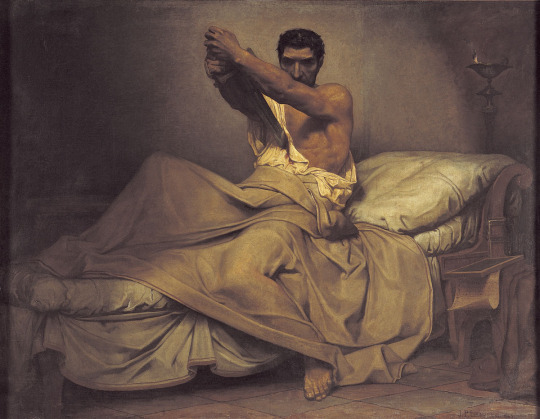
The Death of Cato of Utica, By Jean-Paul Laurens.
In early 46 BC, Caesar defeated the army of Cato the Younger, also known as Cato of Utica . Cato did not take part in the battle and being in Utica, Africa, after receiving the news that Caesar had won and pardoned his adversaries, decided to take his own life at the age of 49. Cato had a republican soul but was stubborn man, and was convinced that Caesar wanted to be king. He was the half-brother of Brutus's mother, Servilla (Caesar's long-time lover).
It was in this same year that Caesar, with the advice of the astronomer Sosigenes of Alexandria, reformed the calendar, leaving each month with the same number of days as it has today and creating the leap year.
The final battle of Munda, in Hispania, was on March 17, 45 BC, thus ending the civil war. Caesar returned to Rome and an intimidated Senate legitimized his victory by appointing him dictator for a ten-year term.
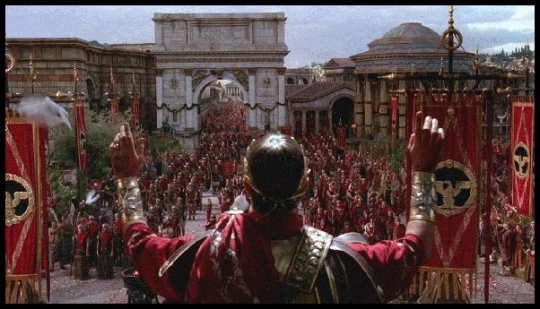
The position of Dictator was created by the Republic itself; he was a magistrate, elected by the Senate, with absolute powers to resolve military emergencies or exceptional tasks for a period of six months. He had to leave after that period or before if he managed to resolve the problem. This 10-year dictatorship was unprecedented.
In February 44 BC, Caesar succeeded in having the people of Rome proclaim him dictator for life. Cicero resigned from political life in protest.
Cassius persuaded Brutus that the only way to save the Republic was to kill Caesar. They needed Brutus to lead the conspiracy because of his prestige; he was not only Cato's nephew but also the direct descendant of the Republic's founding father.
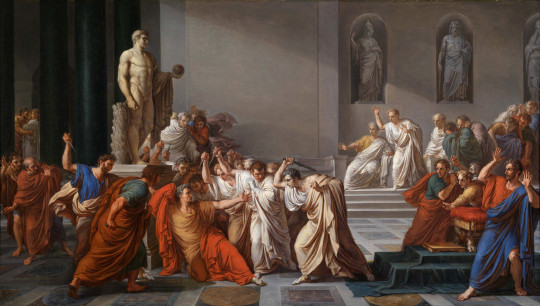
The Death of Caesar. By Vincenzo Camuccini (1805)
On 15 March 44 BC the group of conspirators intercepted Caesar just as he was passing the Theatre of Pompey, where the Roman Curia was meeting, and led him into a room off the portico. Lucius Tillius Cimber, under the pretext of presenting a petition, grabbed Caesar's toga with both hands and pulled him so tha Publius Servilius Casca could stab him, causing Caesar to exclaim "Ista quidem vis est?" ("What kind of violence is this?") Casca, drawing a dagger, slashed him across the neck. "What are you doing, Casca, you villain?" were perhaps his last words.
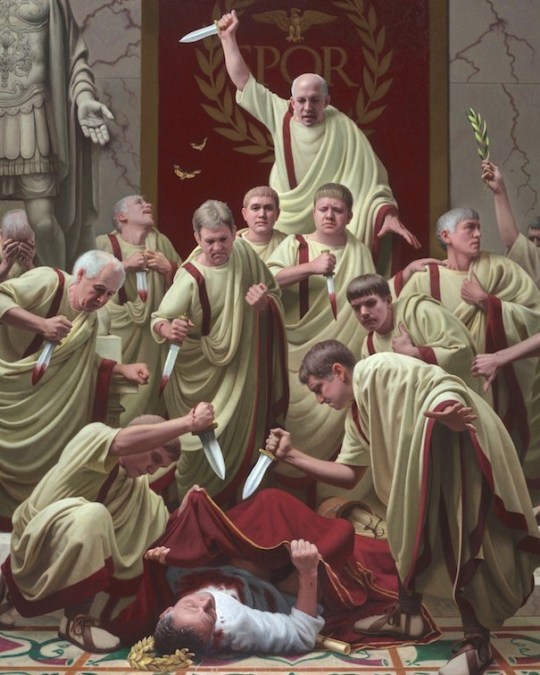
According to classical sources, he tried to flee but slipped on his own blood. A Roman coroner stated that "Caesar's body had several cuts, and 23 stab wounds but only one of them, in the chest, was fatal." They also claim that as he lay dying he took his toga and covered his face so that no one would see him die. He was 55 years old.

Mark Antony with other colleagues carefully collected the body and carried it before the people. Then he made a memorable speech.
The month then called Quintilis, the month of Caesar's birth, was renamed Iulius (July) in his honour on the initiative of Mark Antony. Julius Caesar was the last dictator of Rome; the office was abolished after his death.
Caesar named his grandnephew Gaius Octavius Thurinus as sole heir and adopted son, taking the name Gaius Julius Caesar Octavianus. As was customary in this type of adoption, he had the name of his maternal relative and since then he legally belonged to the family clan, in this case the Julii, adding to his new name the original paternal lineage: Octavianus ( "of the Octavii").
A good example to understand this is the father of Empress Livia, who was born with the name Appius Claudius Pulcher and who, upon being adopted by his maternal uncle Marcus Livius Drusus, changed his name to Marcus Livius Drusus Claudianus.
But nowhere in Caesar will did he say that his nephew should be his successor in office. It was very common among Roman aristocrats without sons to adopt a nephew, son of a sister or niece, or a grandson through a daughter if the father had already died, to continue the surname or clan name (nomen gentile).
If he legally recognized Caesarion, the boy would become a Roman citizen, and it would be a serious problem if the king of Egypt were Roman, as he could claim a throne in Rome. This shows that Caesar did not intend to establish a monarchy and was genuinely concerned about his fatherland.
Octavius certainly benefited from the adoption, but he became the Emperor of Rome thanks to his iron will, extraordinary cunning and political skill.
After his death, Caesar was proclaimed Divus Iulius, or the Divine Julius. He was the first Roman ruler to be deified.
After the end of the Julio-Claudian Dynasty, the cognomen CAESAR would become a Title of the Imperial Power, even many centuries later translated into other languages, such as the German Kaiser or the Russian Tsar.

In front of the theatre, an altar was erected where the pyre was placed so that Julius Caesar's body could be cremated in great mourning. Part of this altar is still preserved in the ruins; more than two thousand years after the assassination, every 15th of March, people come to leave flowers there.

Photo by Giovanni Dall'Orto, taken on March 15, 2008 Attribution, via Wikimedia Commons
191 notes
·
View notes
Text

In the United States (and queer spaces and places around the world), June marks Pride Month, a time of crossing horizons and transcending rainbows a la community bridge building, restorative justice and healing, good music, good fellowship, and good trouble made manifest through organized divestment, radical resistance, and, of course, upRooting our shared (and very segregated) miseducation about this world’s queer past.
Within the folds of the archives and inbetween the texts and textures of our histories, memories, and lived experiences, aid a story about the human condition that disrupt and dismantle the (hu)manmade binaries that plague and pollute our worldviews (and systems of reality).
This mini-series is a prelude to a future project I hope to add to our growing community garden. Supporting these public history learnings and upRootings through @patreon helps feed and fund this labor of love and liberation. Come join our garden community at www.patreon.com/antiracistliberation (like floating above in the bio)
#anticolonial queerness#antiracism over apartheid#antiracist liberation#neighborhood historian#good trouble#queerness is ancestral#padawan historian#free us all#dawn hall#our history is your history
13 notes
·
View notes
Note
Ok, I've been thinking about this question a lot and there's not enough evidence in P&P to fully support any answer, but I wanted to hear yours: What is the Gardiners' economic status/How rich are the Gardiners?
Obviously, Mr. Gardiner is a tradesman, but I'm desperately curious to know the extent of his wealth. Does he have a similar income to Mr. Bennet but is just more frugal? Would he have been able to take in his niece(s)/sister when Mr. Bennet died? Does he have Bingley-level tradesman wealth without the massive lump sum Bingley inherited from his father? Darcy assumes that Mr. and Mrs. Gardiner are gentry - but like, Bennet gentry or Woodhouse gentry or Lucas gentry. JANE SKIMPED ON THE GARDINER INFORMATION AND NOW WE'LL NEVER KNOW. So what are your headcanons surrounding the Gardiners' wealth?
Really, the most important Gardiner headcanon that the Gardiner children are immediately charmed by Darcy and think he's like ~the coolest~
thanks queen <3
Six months later: hi!
My opinion is that the Gardiners are very well-off in terms of the usual incomes of the gentry. It's difficult to pin down an exact income range because I'm not a historian or economist, but the literary evidence is pretty suggestive IMO.
For one, Mr Bennet has no trouble believing that Mr Gardiner could have shelled out ten thousand pounds for Lydia; the problem is the struggle of repaying him, as Mr Bennet would feel morally obligated to do. The impression I get is that this would be a lot of money for Mr Gardiner to come up with, but everyone accepts that he could quickly do it, where Mr Bennet could not. And Mrs Gardiner does insist that Mr Gardiner would have paid the money if Darcy had let him, which again suggests that it was reasonably doable for him.
When Elizabeth and Jane first pass the news to Mrs Bennet and try to express the debt of gratitude they all owe Mr Gardiner, Mrs Bennet's response is a bitter remark about how if her brother had not married and had children of his own, "I and my children must have had all his money, you know; and it is the first time we have ever had anything from him except a few presents."
Aside from what this reveals about her character (especially given the remarkable understatement of "a few presents" given everything they've done for Jane and Elizabeth), I think "all his money" suggests an awareness that there would have been quite a bit to inherit if Mr Gardiner hadn't had the temerity to, uh, have children.
The summer tourism journey also doesn't seem to represent a severe expense for the Gardiners, though it would be outside the realm of possibility for some. They're not super frugal, but they're also not going to pull a Sir William Lucas and abandon the source of their income, or take an estate or something to distance themselves from trade, and end up unable to provide security for their children or any significant luxuries for their loved ones and themselves. So the Gardiners do make practical decisions like living near Mr Gardiner's warehouses and continuing his business in town.
Darcy (in Elizabeth's opinion) mistakes the Gardiners for "people of fashion" rather than gentry per se. This is interesting because Darcy originally considered the entire Meryton neighborhood, including the local gentry, as people noticeably not of fashion. This concept of people of fashion is typically more about fashionable high society than trade vs gentry IMO.
For instance, Mr Hurst is described as "a man of more fashion than fortune"—i.e. someone with high society credentials from his family, but not a lot of money, though he has enough to maintain a house in Grosvenor Street. (I think the implication is that the Hursts considered their status and Louisa Bingley's 20,000 l. from trade a fair exchange.) So likely, Darcy is not confusing the Gardiners for minor rural gentry, but even higher-status people if Elizabeth is analyzing his reaction correctly, based on their appearance, apparel, demeanor, etc.
This is definitely a time when wealthy people in trade could pass for people of fashion, but I think it would ordinarily take some doing, and though the Gardiners are stylish and relatively young, they aren't trying hard in the way that the Bingleys are. Yet Darcy, who went on a whole tangent about trade cooties during his proposal, can't even identify the Gardiners as people in trade upon meeting them—that's important.
(It's also significant, of course, that he's surprised to discover their exact connection aka that they're Mrs Bennet's relatives, which is honestly pretty fair. In any case, he evaluates Mr and Mrs Gardiner on their own considerable merits by this point.)
So again, I get the sense that the Gardiners are quite well-off people who spend their money on nice enough things that they can be mistaken for a completely different class than their own, but are not specifically aiming for that or super extravagant, either. Their habits seem rather similar to Darcy's, actually—I don't think they're anywhere near as wealthy, but they're wealthy enough that they can approach major expenditures fairly casually, as he does. But unlike Darcy, it will always be contingent on Mr Gardiner's business success and they have to plan around his work and the possibility of sudden changes in terms of his work.
I personally think that Mr Gardiner would undoubtedly have been able to take care of his sister and nieces in the worst case scenario. Six women used to a high standard of living (we know Mrs Bennet is extravagant; it's only Mr Bennet's frugality that keeps the Bennets out of debt as it is) would probably be a strain, but I don't think beyond the income level indicated, even accounting for the needs of his immediate family.
When Mrs Bennet is dramatizing herself during the Lydia disaster, she tells Mr Gardiner, "if you are not kind to us, brother, I do not know what we shall do," and he assures her of his affection for both her and her entire family. This could be seen as a sort of empty redirection that avoids promising anything, especially given that her catastrophizing fantasy scenarios are extremely unlikely, but I think that's a misread of his character.
I see his reply as a tactful assurance that, in the (improbable) event of Mr Bennet dying in a duel, his affection for her and her daughters would indeed ensure his protection of her and her daughters. There's no doubt from anyone that he's capable of doing this, though it would certainly mean a change in their style of living that Mrs Bennet would vocally resent.
So while this isn't super-specific, I hope it helped!
Normally I don't need to do this, but I would like to add a sort of credit/disclaimer: I didn't initially notice all these signs and my understanding of the Gardiners' standard of living and general circumstances was, I believe, strongly influenced by JulieW of the Life and Times board at Republic of Pemberley back in the earlyish 2000s (maybe about 2006?).
The L&T board is sadly gone (or was the last few times I checked), though ROP clings to life, but she knew a lot more about Georgian history and culture than I ever will, and these references to the Gardiners' prosperity seemed really glaring once she pointed them out.
(Her analysis of Pemberley's age, architecture, and general class significance was also really influential and I'm still really sad that I have to rely on the perfidy of memory about it.)
#rop was not really a natural home for me but l&t was SO good ;_;#treesthatarepeachy#respuestas#edward gardiner#m gardiner#mr bennet#mrs bennet#pride and prejudice#jane austen#anghraine's meta#long post#nice things people say to me#fitzwilliam darcy
235 notes
·
View notes
Photo
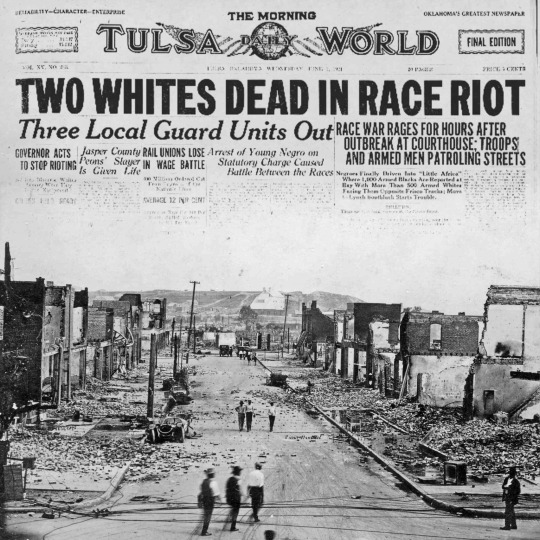
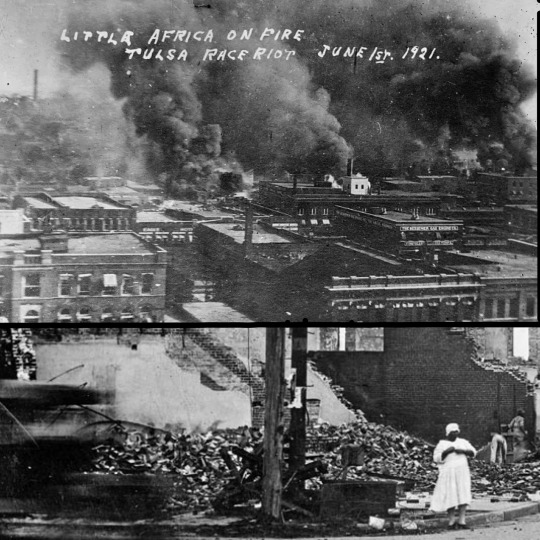
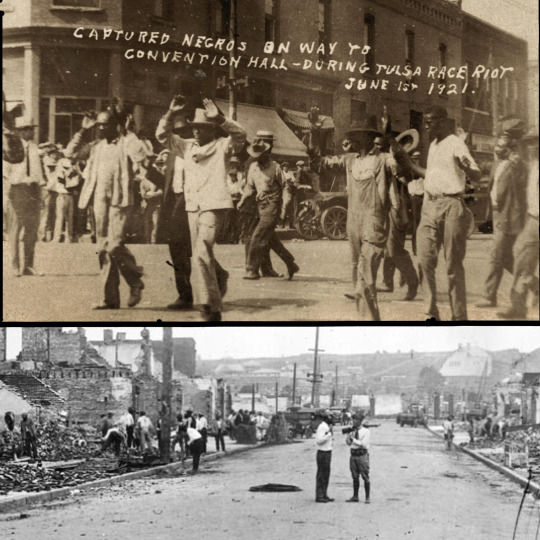

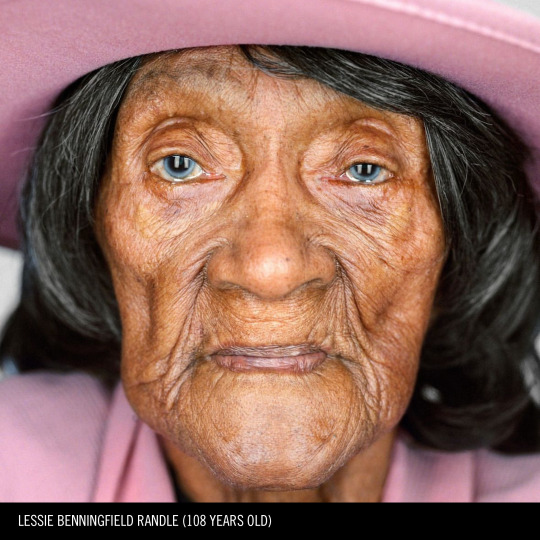


On this day 103 years ago “a prosperous Black neighborhood in Tulsa, Okla., perished at the hands of a violent white mob.
The mob indiscriminately shot black people in the streets. Members of the mob ransacked homes and stole money and jewelry. They set fires, ‘house by house, block by block,’ according to the commission report.
Terror came from the sky, too. White pilots flew airplanes that dropped dynamite over the neighborhood, the report stated, making the Tulsa aerial attack what historians call among the first of an American city.
The numbers presented a staggering portrait of loss: 35 blocks burned to the ground; as many as 300 dead; hundreds injured; 8,000 to 10,000 left homeless; more than 1,70 homes burned or looted; and eventually, 6,000 detained in internment camps.” Via The New York Times circa 2021.
The losses recounted represent black victims. Over time the event, initially called the Tulsa Race Riot has been accurately renamed the Tulsa Race Massacre. A riot, by definition, is a noisy, violent public disorder caused by a group or crowd of persons, as by a crowd protesting against another group, a government policy, etc., in the streets. A massacre is the unnecessary, indiscriminate killing of a large number of human beings or animals, as in barbarous warfare or persecution or for revenge or plunder.
More than one hundred years after this act of terrorism, the last three survivors continue fighting to have their case for reparations heard by the Oklahoma Supreme Court. In October of 2023, one of them, Hughes Van “Uncle Redd” Ellis, Sr., passed away.
258 notes
·
View notes
Note
MORE RANDOM SEVIKA HEADCANONS PLS!! i love how you think
more?!!?? okay!!!! :D
men and minors dni
she'd only get on social media to follow you. she'd have to have you help her set up her profiles and stuff, never posts anything (unless she's reposting your pictures with a bunch of heart and flame emojis) and never logs on (unless she gets a notification that you've posted, because of course she has notifs on for you.)
old people LOVE her. she's like catnip to them. some of it is because she's an old grump already, but most of it's just 'cause she's quiet enough to listen to them yammer on about 'the good old days.'
she acts like she hates it-- but you always catch her shoveling your elderly neighbor's driveways during the winter and helping little old ladies cross the road. (she's part of the neighborhood book club too-- just a bunch of elderly ladies and sevika reading trashy smutty novels and laughing over spiked tea once a week. when it's your turn to host, sevika blushes bright red every time you bring her and her friends cookies and snacks: they're all cooing about how sweet of a couple you are, asking sevika when they can expect to have little feet running around the neighborhood)
she quits smoking when you get pregnant with little fucker.
one of her favorite ways to dodge a craving for a cig is to use her mouth for something much more satisfying-- like kissing you, or eating you out, or sucking hickeys into your skin...
every once in a while she'll still sneak a cigarette-- not because she misses it, but because she knows if she goes home smelling like tobacco you'll start peppering kisses on her mouth every ten minutes to make sure she's too distracted to smoke again.
she's sooo frugal. i think the reason she's wearing the same outfit for the whole show is she's just the type of person to be like "it still works?" while talking about her boxers that have a quarter sized hole near the crotch.
it's cute in some ways. she never throws out an old glass or jar-- most of your cups and storage is old pasta sauce and jam jars. each empty bottle of whiskey becomes a vase on a shelf or windowsill-- for little flowers, leaves, and weeds you and sevika always bring home to brighten up your space.
it's annoying in other ways. you have to secretly throw out her old socks and underwear once or twice a year, slowly replacing them with new socks-- but not too quick, or else she'll get suspicious as to why all her socks are hole-less.
she gets a little bit better at spending when little fucker comes around. she just can't say no to her own baby.
taglist!
@fyeahnix @lavendersgirl @half-of-a-gay @thesevi0lentdelights @sexysapphicshopowner
@shimtarofstupidity @chuucanchuucan @badbye666 @femme-historian @lia-winther
@ellsss @sevikaspillowprincess @emiliabby @sevikasbeloved @hellorai
@glass-apothecary @macaroni676 @artinvain @realgreeniebeanie @k3n-dyll
@sevsdollette
188 notes
·
View notes
Text
There's a door somewhere that's been closed forever. As long as people can remember, the first records of its existence, it's been closed. And even in the first records of its existence, people were watching it, waiting for it to be opened.
It's a massive door, in an underground chamber, the room its in is the largest room on earth. It's beautiful and ornate, and so strangely alien. After the initial hallway the room with the door is the only room in the chamber, like it's the entrance to a massive complex that humanity will never see. It's architecture is like no known culture, there are carvings on the walls of animals that don't exist, and writing in a language nobody knows. Some think that it's the work of aliens, some think it's the work of an advanced ancient culture, others that it's the work of beings from another dimension. Scientists and historians find all of those possibilities disturbingly possible.
There are tons of theories as to what's beyond the door. Every single religion that has come in contact with the door has managed to tie it into its mythology, especially ideas about the end of the world. And secular conspiracy theorists love it just as much. There are theories that the door will lead to hell, and that the rapture will start when it opens, theories that the door is where the messiah waits, or where God's body on earth is. There are theories that behind the door lies the secret of eternal life. Theories that aliens will open the door when they're ready to contact humanity. Theories that behind the door are the secrets to the universe, that it'll usher in a new age of humanity when opened. Theories that there's treasure behind the door, or technology that will change the way humanity lives. But there is one throughline amoung almost all theories, at least those belived by those invested in it, which is that they believe the door will open soon, and that those who see it opened will benefit the most. And there's been theories like this for thousands of years.
People of all religions will save up to make holy pilgrimages to the door, skipping meals, depriving their children of toys, so they can sit in front of the door for a few days, hoping to be the ones to see it open, returning home disappointed. There are conmen who'll sell the smallest things from the door, from water thats touched it, to pebbles that have fallen off of it, and people will believe it'll heal the sick, or work miracles. In ancient times conquerors would go to the door, making such a big deal out of it being in their lands. In modern times a small republic of a few thousand people, as old as the first world war, controls the territory of the door, they do their best to let people of all walks of life come to it, and try to stop any single group from dominating the space.
And of course there are people who live near the door. The entrance to the chamber is now surrounded by a modern city, and the room the door is in, and the hallway before it, are so large that they basically contain an entire town/neighborhood. The people who live in the room of the door are all those who are waiting for it to open (and a small population of people making good money off of them). They all have their own sections within the giant room, from evangelicals waiting to see Jesus behind the door, to alien theorists waiting to see the secrets of the stars, to new agers waiting for the opening of the doors to enter earth into a new era. The underground town is one of the most crowded places on earth, and as long as you're outside you can see the doors. Basically everyone who lives there thinks it's the only place they can ever be, as dark as it is down there they need to live where the doors will soon open. Some even go so far as to never leave the room even temporarily, many people living and dying in this one underground room, never being anywhere else, never seeing the sun. When those who where born in the room grow up to move somewhere else, abandoning their hopes of seeing the door open, their parents grieve as if they've lost their chance at salvation, and mourn them as if they were dead oftentimes.
Trying to get very close to the door is nearly impossible. It gets more and more crowded the closer you get to the door. And the space where it's close enough to actually touch the door is constantly covered with people, you have to sift through the thickest crowds on earth to get close enough to touch it, and people, thinking it has mystical properties, will. People have been trampled to death trying to touch that door. The entire underground town is unreasonable crowded, but nothing comes close to that small sliver of space where the door can be touched.
Science has had a rough relationship with the door. In older times people have tried to open it. The last time it was tried was when it was under British rule in the 19th century. It didn't go well. They might be able to do more now, but most of the people the door is important to don't want them to. There was a scientist who was beaten to death by an angry mob in the 1970s for suggesting there might he nothing more then an empty room behind the door, not even that it was likely, juet that it was possible. Science has spoken little on the door since then. And the government that has the territory of the door now does not allow any door based science to occur.
The reason why I bring all of this up, is that a few days ago the doors opened just the slightest amount. Not enough for anyone to step through, but enough to be noticeable. It's so hard to see through, but reports are starting to come in. They say that behind the door is a short hallway, and at the end of the hallway is another set of doors, of similar size and shape, waiting just as patiently to open.
#196#worldbuilding#writing#my worldbuilding#my writing#fantasy#urban fantasy#magical realism#short fiction#short stories#short story#flash fiction#original story#original writing#original fiction#speculative fiction#fiction#science fiction#alternate history#unreality#creative writing#writers#writers on tumblr#writeblr#writers and poets#religion#social commentary#writerscommunity#stories#storytelling
68 notes
·
View notes
Text
The Path to the Veil Legacy Challenge
By SilverPhoenix42 aka me & @streetrabbit42
Needed Packs: EP: Life & Death, City Living, Snowy Escape, Island Living (OPTIONAL) GP: Werewolves, Parenthood, Vampires, Realm of Magic (OPTIONAL) SP: Paranormal (OPTIONAL)

Generation 1: Aspiring Occult
You’ve always loved the paranormal, so when you met your future spouse, you were overjoyed when they told you their secret.
Aspiration: Big Happy Family
Traits: Family-Oriented, Neat, [Your Choice]
Max Skills: Parenting
Career: Any Career
Rules:
Marry a Werewolf, Vampire, Mermaid or Spellcaster
After marrying you must quit your job
You must have at least 3 children
Have at least one Werewolf child
Werewolf child is the Heir
You don’t have to complete the final level of your Aspiration

Generation 2: Happily Different
You live in a very crowded house, and nearly every one of you isn’t human, so you’ve come to take great pride in your differences.
Aspiration: Choose one of the Werewolf Initiate branches (except Cure Seeker)
Traits: Cheerful, Outgoing, [Your Choice]
Max Skills: Charisma
Career: Freelancer - Paranormal Investigator Branch
Rules:
Must have at least 2 children
Have a bad relationship with your child Heir, but have a good relationship with the other child(ren)

Generation 3: Family Feud
You never got along with your siblings, and always wished you were like the other kids… which your family did not understand. So you sought out a way to become normal. But having a shitty mixology skill, you couldn’t take the usual route.
Aspiration: Werewolf Initiate - Cure Seeker route
Traits: Loner, Gloomy, [Your Choice]
Max Skills: Piano
Career: Freelancer - Programmer Branch
Rules:
Have a low relationship with your sibling(s)
Don’t complete your aspiration
Have a low or non-existent mixology skill (if you have a mod for it, make it their ‘weakness’ or non talent)
Must complete your bucket list and reincarnate while alive

Generation 4: Another Chance
You remember your past life, and don’t want to repeat it again, so you set out to live it as differently as possible.
Aspiration: Neighborhood Confidante AND THEN Friend of the World
Traits: Good, Skeptic, [Your Choice]
Max Skills: Logic, Charisma
Career: Politician - Politician Branch
Rules:
Have at least 2 children
1 Child must become a vampire
Have a bad relationship with your vamp child after they turn
Have a good relationship with the human child
The Heir can be either child

Generation 5: Life Comes at You Fast
You want to learn more about what your parent hated so viscerally.
Note: This works for either heir option
Aspiration: Ghost Historian
Traits: Chased by Death, Adventurous, [Your Choice]
Max Skills: Thanatology, Medium AND/OR Vampire Lore, Rock Climbing OR Skiing OR Snowboarding
Career: Secret Agent - Either Branch
Rules:
Have a bad relationship with your sibling(s)
Have a bad relationship with your (reincarnated) parent
Die as a young adult

Generation 6: Epilogue
You died. Good job. Now, are you going to take your anger out on the living, or will you move on into the light?
Aspiration: Choose your aspiration
Max Skills: Mischief
Career: Unemployed
Rules:
Complete your Aspiration
Either become a mad ghost or complete a bucket list to move on

Credit to @cafekitsune for the dividers!
#challenges#sims 4 challenges#ts4 challenges#StreetRabbit42 challenge#SilverPhoenix42 challenge#Valkerie Challenge#ts4 challenge collab#legacy challenge#sims 4 legacy#ts4 legacy#sims 4 legacy challenge#Path to the Veil Legacy#Path to the Veil Legacy Challenge#mini legacy challenge#mini legacy
92 notes
·
View notes
Text
so i went to a remote area this weekend for a field work and i cant help but imagine erwin during the ride... like in an interview he said that if given the chance, he would like to live in a remote cabin, right?

LIVING IN THE CABINS OF TROST
ERWIN SMITH X GENDER NEUTRAL READER
TAGS: post-canon, erwin lives agenda, fluff, age-gap (lol rie tell us what we don't know!), love confessions, basically jus wholesome stuff
WORDS: 2k
Trost District’s advanced practice had saved their economy from titan invasion years ago, but sadly not every district in Paradis would like to apply it in consideration to the nobilities. In principle, you’d like to have it implemented in the rest of the island whose pride has long belonged in its rich agricultural resources. To know the bounties of Trost to the fullest, you’ll have to live with them for a month!
Lo and behold, you’ll come across the Erwin Smith as one of the residents. You see, he doesn’t talk much to people, let alone from outsiders, but the villagers love him because of his kindness and intelligence; they’re confident that if there’s someone who could help you the most, it’ll be no other than this man. And, strangely so, Erwin welcomed you with open arms the moment he knew of your research.
He doesn’t want the residents to treat you as an inconvenience so as soon as he learns your university isn’t funding student researchers—which makes you lack the resources to rent a dorm in Trost—he gladly opens the spare room he had built inside his cabin at your disposal.
However, amidst the neat and swift arrangement, you can’t help but be bothered because not only is he so kind for reasons you’re yet to unveil, but you are to live with him! A very handsome middle-aged man who is unreasonably single, especially in a period where people as young as sixteen are already bearing children!
Maybe the sheer change the Paradis had become since the walls collapsed has something to do with it?
However, it isn’t long until you’ve learned that he is none but the very commander who had contributed the most for the freedom of Paradis. He suddenly blurts out over breakfast that he was the 13th Commander back in his prime. The 13th commander of the Scout Regiment. You took history classes really well so you know what the 13th commander has done; it’s just that you never remembered his name because as far as you are concerned, the former commander opted not to publish his name in books and told the historians to ensure every contribution of his comrades would be noted instead. Your teachers spoke of him so highly–indeed, an amalgamation of what a real leader must be.
The way you started shaking over the coffee and bread Erwin had prepared made him panic, “Oh no, was the coffee too strong for your liking? I'm so sorry.”
And when you eventually cry and utter praises and gratitude for serving the country well, he starts laughing—boisterously so. That was sure a laugh he had never done during his prime.
He then pats your head, “Well, our efforts have never gone to waste because of smart students like you, no?”
To integrate more with the Trost community, Erwin fetches you to other neighbors using his old car every morning (he bought it for a discounted price at an auction—scratch that, the merchant almost gave it to him because he was a huge fan. Had Erwin been a boastful bastard, he wouldn’t even bother paying for it). He says the ride to another farm takes around half an hour, so you two take your time talking about a lot of things. He turns gloomy whenever the topic of being a commander is talked upon, so you’re always sure to stay with the menial—his favorite areas on his lawn, the things he’d like to do in the future to make his little paradise even better to live in, and more.
Oh, how badly you yearn for a life like his.
And when late afternoon comes, Erwin would pick you up from the neighborhood so you can accompany him to the wet market approximately an hour away. Erwin usually takes this chance to talk to the merchants because he supplies them his harvest at a low price for extra income (what a strategic and simple man he is!) then you two would restock condiments and other needs in the house that his small farm couldn’t provide. The life Erwin has is surely tiring for you who’s basically raised in a highly urbanized area, but that doesn’t mean you don’t enjoy it especially with his company.
One of the best things he has ever shown you is the tiny river surrounded by giant trees where he takes a bath. The scenery makes you feel like some sort of deity in an urban legend; sun would peak behind the leaves and onto the water, then the water would bounce back its light towards your glimmering eyes—full of adoration at god’s creation. The river is quite cold and sometimes the breeze these trees exude freezes your skin, yet it feels so fresh, so pleasing to look at, and you wouldn’t mind if you’re not accustomed to taking a bath in an open area. No reason to be scared, too, as the singing birds and cicadas keep you company. Not far from here, you could also hear Erwin’s daily wood chopping. Of course, he’s just there, ready to rescue you if you slip on the rocks or some intruder tries to come at you.
One of the best tasks he had entrusted you with (which you asserted to be tasked because you couldn’t fathom not paying him rent) is plucking ripe fruits from his farm. In your hometown, every need comes with money, but here, one could survive with just the gifts of land ripened by their hard work.
“It makes your research more valuable, doesn’t it?” Erwin affirms. “Imagine every citizen in Paradis being able to live a life not based on money once the government appreciates agrarian reforms more, given how rich our country is with natural resources.”
The distance you had with him as he intricately teaches you how to cut fruit from its stem, his appreciation for your principles (which students from the urban area often laugh about), and the way his hands brush against yours while he’s correcting your posture because the way of cutting needs to be precise so the stem could still be capable of bearing another fruit—it all fills your heart with sheer warmth. When night comes and you’re alone in your room, you finally deduce what you feel for him—it’s not just mentorship that you want, or his kindness, or even his farm.
You want him as he is. You want to give back all the help he has given you by loving him with all your heart.
As the research is about to end, you realize that you soon will be bidding him farewell to go back to your hometown, to live a boring university life, to take a bath in the constricted bathroom of your dormitory, and to worry about filling money up your sleeves so you could eat instead of just plucking out leaves and straight up cooking it. It fills your heart with sorrow; you hope you can just stay with him.
On one of your final days in Erwin’s house, you wake up with rain so strong tip taps of water can be heard from the roof towards the wooden floor. Erwin knocks and asks if he could fix it as you eat breakfast but as soon as you open the door for him, you start crying.
“I'm sorry, it happens a lot during rainy days. I should've warned you.” Perhaps he’s thinking that an urban girl like you would deem living in this wooden cabin overwhelming, but it’s rather far from it. “I’m thinking of replacing the roof with cement instead of mere iron strips, but I can only do that when summer comes. you might not be here anymore by that time, though.”
“Can I just live here for good? I don’t want to go,” you wail, the attachment and adoration you have for this new friend flowing through your tears. “I want to live here for good!”
“Because you want to witness the renovation of my roof…?”
“No!”
Erwin is surprised at your sudden rise in tone, but eventually he smiles—he smiles despite not understanding it all, “I’ll consider, but only after you let me fix the hole in your room.”
It took you five minutes of wailing (and Erwin’s gentle taps on your shoulder) before you stepped away from the door and let him in, with which he whispered a small praise, “Good girl. Now come on, eat your breakfast and drink your coffee. We’ll talk after I'm done here.”
His voice sounded so warm, deep, and gentle in that particular remark.
You manage to do what he asked of you, albeit with little hiccups. To be honest, had Erwin lacked the academic knowledge to help you finish your research, your stay in his home would’ve lasted longer. but he’s such a smart man—even on par with your actual research professor—that it even makes you wonder if his parents were formerly part of the academy, too.
When Erwin learns of that fact, he laughs in guilt, “I'm sorry! I admit I got too caught up with your research. You should’ve shooed me away when I got too invasive! Is that why you were crying?”
“No! It’s because I want to stay with you longer!” you cry, albeit impulsively, because you are drenched in cold water as soon as you see Erwin’s surprised face.
Nonetheless, he’s able to compose himself, “Seems like you loved living in Trost, hm? It’s okay, you could visit us here even after your research is—”
“I meant you! I want to stay with you specifically!”
Oh god, did bathing in the river give you a bravado as strong as Erwin’s? You’re not usually this blunt.
“Why, if it’s fine to ask?” Erwin starts, his face more serious this time around, albeit there’s a tinge of expression you couldn’t quite decipher.
You wouldn’t be able to take this back. You wouldn’t be able to take this back. You wouldn’t be able to take this ba— “Because I like you!”
You wouldn’t be able to take that back!
“Oh god,” you covered your face in embarrassment. “I-I’ll be back! I’m sorry!” then you stand up from your seat and hurry towards the door.
You run to the secluded river to wash your face from embarrassment (or perhaps drown in it for good), but after a throaty scream of shame, you notice a presence behind you.
“E-Erwin!” you screech in surprise. “I told you I’ll be back soon!”
“Repeat what you just said.”
“The what?”
“What you said before running off. Repeat it.”
“Are you angry?” you weakly mutter.
“What? No! I mean—” the unusual stuttering made Erwin chuckle in defeat. “Please, I just want to hear it again.”
His soft eyes on the ground, one you couldn’t quite decipher earlier, is much more understandable now. It gave you more courage to admit more, “I said I like you.”
“As a host or…?”
The question almost ruins the mood, and yet you think that’s the most adorable Erwin has been since you’ve known him. All this time you thought of him as someone who knew everything astutely.
“What do you mean ‘as a host?’ I know we have a bit of a generational gap but I’m certain what I said was clear enough!”
He walks closer until you’re centimeters apart, eventually he smiles in realization. Then he cups your cheeks and says, “Finish your research and come back here. you’ll hear my answer by then.”
“Huh?” you scorn, “Why don’t you answer now while I’m still—”
A kiss on your forehead cuts you off. It lasts for ten seconds or so—you know because you started counting it out of fluster. While on it, he rubs his thumb on your cheeks in circular motions. The sensations render you in a haze. As soon as he withdraws, you bury your head on his chest, taking his scent in even though you don’t understand what’s happening.
“What I could offer to you is nothing in comparison to the life ahead of you in Stohess. Do what you must there—submit your research, advocate for your principles until your voice reaches more people, and if by then you still can’t stop thinking of me, by all means, stay by my side for good.”
“How can I be sure that you’re not married the moment I come back?!”
He chuckles, then places your hand on his chest. His forehead bumps on yours, a knowing smile plastered on his lips, and his eyes reeking of adoration. “Because my heart has been yours the moment you set your foot here.”


p lease i encourage everyone to continue this fic for me because as much as i love the prompt i donT HAVE THE TIME TO TURN IT INTO AN ACTUAL THING 😭😭😭 PLEASEDKDKSED
also here's a majestic fan art of idrawr16yt that helped me visualize what a retired-commander-living-in-the-countryside erwin smith would look like
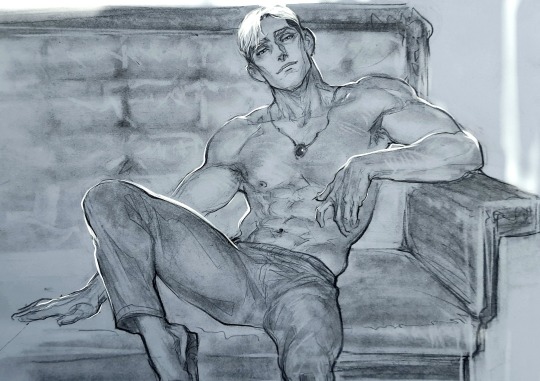
🔖 @xiaotopia @cadenza-damour @rinamars @grimistheangerinmystares @suntizme @onasvigo @inkofteyvat @aeanya @watyousayin @collinnmckinley @frenchdyer | SUBSCRIBE/UNSUBSCRIBE TO MY STORIES
#I FINALLY MANAGED TO WRITE IT#JDIFEDJKEJDISXJKS#I CANT STOP THINKING OF IT LAST SATURDAY HHEEELLPP IM BEYOND SAVING#erwin smith x reader#erwin smith x you#erwin smith x y/n#erwin smith canon#erwin smith fanfic#erwin smith fanfiction#aot x reader#aot x you#aot x y/n#aot reader insert#aot fanfiction#aot erwin x reader#aot erwin x you#aot erwin x y/n
116 notes
·
View notes
Text

The 306 Workshop Group in front of 306 West 141st St., late 1930s.
The 306 Workshop Group, also known as the Harlem Art Workshop, was founded by artist Charles Alston. This group served to bring together Black artists such as Jacob Lawrence, Romare Bearden, Augusta Savage, and Langston Hughes, just to name a few. Located at 306 West 141st Street in Harlem, the Harlem Art Workshop provided these artists with both a meeting and work space. In the 1920s, Harlem became a coveted address. The neighborhood in New York City was synonymous with an outpouring of production in the visual arts, music, literature, theater, and dance that some began referring to the creative era as the Harlem Renaissance.
Famous artists of the Harlem Renaissance included: sociologist and historian W.E.B. Du Bois, writers Claude McKay, Langton Hughes, and Zora Neale Hurston, musician Duke Ellington, and entertainer Josephine Baker. These artists strove to express their racial identity and pride.
Jacob Lawrence, an artist of the Harlem Renaissance, believed his paintings were “a portrait of myself, a portrait of my community.” The community he grew up around included artist and mentor Charles Alston and leading philosopher Alain LeRoy Locke.
The people of Harlem and their rich heritage were constant sources of inspiration for Lawrence. The community experience—its triumphs and tragedies, its dreams and disappointments, its pleasures and humility, collectively forged by the Great Migration, the Harlem Renaissance, and the Depression era—lives on in his paintings.
Photo & text: Phillips Collection
#vintage New York#1930s#Harlem Renaissance#306 Workshop Group#Harlem Art Workshop#1920s#vintage Harlem#Charles Alston#Jacob Lawrence#Romare Bearden#Augusta Savage#Langston Hughes
224 notes
·
View notes